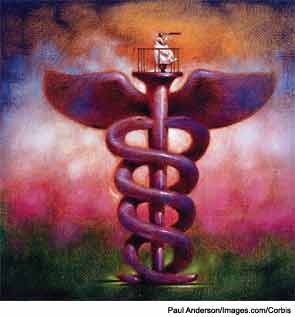
Explore This Issue
July 2013 “I do not think I deserved an “A” for every patient I treated, which was the basis for trying to improve my practice. This is the essence of MOC, which seems to be lost in the discussion.”
“I do not think I deserved an “A” for every patient I treated, which was the basis for trying to improve my practice. This is the essence of MOC, which seems to be lost in the discussion.”
—Robert H. Miller, MD, MBA
The American Board of Medical Specialties (ABMS) maintenance of certification (MOC) program was a hot topic of discussion at the recent American Medical Association House of Delegates meeting, which took place June 13-19 in Chicago. Several anti-
MOC motions were made, with some passing the House. It seems the basic issue for some doctors (but certainly not for all of the delegates) is that they do not want to do MOC. Some of the more vocal participants said they practice the latest medicine flawlessly and don’t need anyone to improve their practice or encourage lifelong learning, particularly the ABMS boards’ MOC program.
To me, perhaps the most notable quote from an MOC opponent was, “If I see 15 patients a day, that’s 15 tests a day. And I have to get an “A” on each one.” I presume this doctor is grading herself, which has just a few inherent flaws. I can honestly say that I do not think I deserved an “A” for every patient I treated, which was the basis for trying to improve my practice. This is the essence of MOC, which seems to be lost in the discussion.
Many of the delegates were very thoughtful in their concerns about MOC: “Does it work?”; “It is yet another expense?”—with some stating that MOC is just a way for the boards to make money. Another delegate added, “It takes time out of my practice when I could be seeing patients.”
I’d like to address each of these important questions.
1. Does It Work?
Although MOC has only been in existence since 2002, there is some evidence that MOC is effective. The ABMS website (abms.org) has information on studies of MOC. As more physicians participate in MOC and as the program itself is refined, more studies should and will be done to document what works and how to improve the system.
2. It’s Just a Way for the Boards to Make Money
The American Board of Otolaryngology (ABOto) has recently reduced the price of its MOC program to $310 a year, which covers all four components. The ABOto financial policy is that all of its products (tests, MOC, etc.) should cover their production and adminstration costs, with no intention of making a profit off any of the products. The MOC fees are currently not covering all of its expenses, a situation that will change as more diplomates participate. When this happens, a combination of a reduced fee and program improvements will be implemented.
3. It’s Time Consuming
Any quality improvement program that encourages lifelong learning requires some time commitment. The ABOto MOC program has evolved a great deal over the past 11 years working within the ABMS-mandated MOC framework. The ABOto carefully studied (and continues to evaluate) each of the four components using the guiding principles of relevance, ease of use and cost effectiveness before sequentially rolling out the complete program. Furthermore, the ABOto has designed and will modify MOC so that diplomates can complete multiple reporting requirements such as PQRS and maintenance of licensure (MOL) by participating in MOC.
One misunderstanding in the debate is that states are going to require MOC to maintain one’s license. The states are developing MOL programs that are similar to, but quite different from, MOC. The fact is that if a diplomate participates in his or her board’s MOC program, he or she will meet the state’s MOL requirement.
If Not MOC, What?
An important point that does not seem to be included in the debate is that the quality improvement train left the station at least a decade ago, and there is no going back to the “old days” of no post-training accountability.
If MOC were to go away as some would like, the practice of medicine would not return to the days of the timeless board certificate without any obligations for quality improvement. Government agencies such as CMS, Republicans and Democrats, payers, and patient groups are all behind quality improvement. Without MOC, the government and others will fill that void, and I think all of us would agree that it is far better for physicians to drive the train rather than non-physician entities.
It is suprising that a few vocal physicians have voiced such strong opposition to something both professionals and lay people view as having a positive benefit for society. I believe we risk a backlash by not endorsing key elements of contemporary medical practice, namely, ensuring the delivery of high quality, evidence-based care. The vast majority of us are willing to go the extra mile to improve our practices and provide the best medical care possible for our patients. If each of us were to switch roles with our patients and ask, “What would I want from my doctor?” the answer is obvious!
Dr. Miller is physician editor of ENTtoday.
Leave a Reply